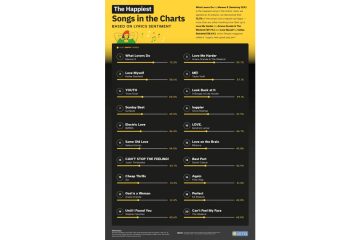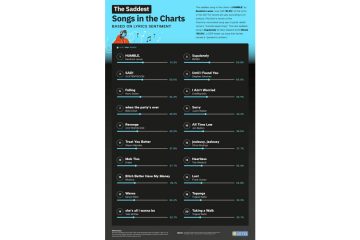Any guesses??
Emotions are an integral part of music, and certain songs can evoke strong feelings within us! Taking that, the website Crossworld Solver used a program called EmoLex to discover some of the happiest and saddest songs on Spotify. What is EmoLex? EmoLex is an emotion lexicon that tracks eight basic human emotions, including anger, fear, anticipation, trust, surprise, sadness, joy, and disgust.
EmoLex then analyses positive and negative associations within English words, making it the perfect tool to reveal the sentiment of popular artists on the streaming platform. Surprisingly, the statistics show that the 2017 Maroon 5 hit, “What Lovers Do”, was the most positive song on Spotify at one point, with a 72.3% rating.
Olivia Rodrigo, the breakout star of 2021, was also found to be a relatively happy-sounding artist, with 24.6% of her lyrics being labelled as positive. This finding is interesting, given that her debut album, ‘Sour’, is known for its heartbreak and emotional depth.
On the other hand, artists like Jason Derulo, Hailee Steinfeld, and GIV?ON were labelled as less happy, with percentages ranging from 18.8% to 19.2%. It’s surprising to see Jason Derulo on this list, as his frequent name usually calls for some cringe footwork on Wedding dancefloors!
When it comes to sadness, Billie Eilish topped the charts with 18.1% of her lyrics being labelled as sad, followed by Machine Gun Kelly at 14.9% and The Weeknd at 12.4%.
The Happiest Songs in the Charts, based on lyrics’ sentiment alone, include “What Lovers Do, Love Me Harder” by Ariana Grande and The Weeknd, “Love Myself” by Hailee Steinfeld, and “Me” by Taylor Swift. Meanwhile, the Saddest Songs on the Charts include Kendrick Lamar’s “Humble”, “Supalonely” by Benee, and “Sad” by XXXTentacion.
Earlier this year, Dr. Michael Bonshor from the University of Sheffield revealed the happiest song of all time. He found that the most uplifting songs contain a tempo of 137 beats per minute (bpm) and an ordinary verse-chorus-verse-chorus structure. However, what makes us latch onto a song is an unpredictable element, like a key change or a “seventh chord.”
Dr. Bonshor continued, “Cheery songs usually have a strong 1-2-1-2 beat to them, so that you can dance along – and a short introduction means the song kicks off with a bang straight away, and there’s not a long build-up.”
So what to make of it all? EmoLex and Crossword Solver have shed light on the happiest and saddest songs on Spotify, providing valuable insights into the emotional impact of music on listeners.




